Fall 2021 Events
Fall 2021 Quechua Series
"Contemporary Quechua Poetry and the Musuq Illa Digital Collective": A talk by Alison Krögel, with guest poet Gloria Cáceres Vargas
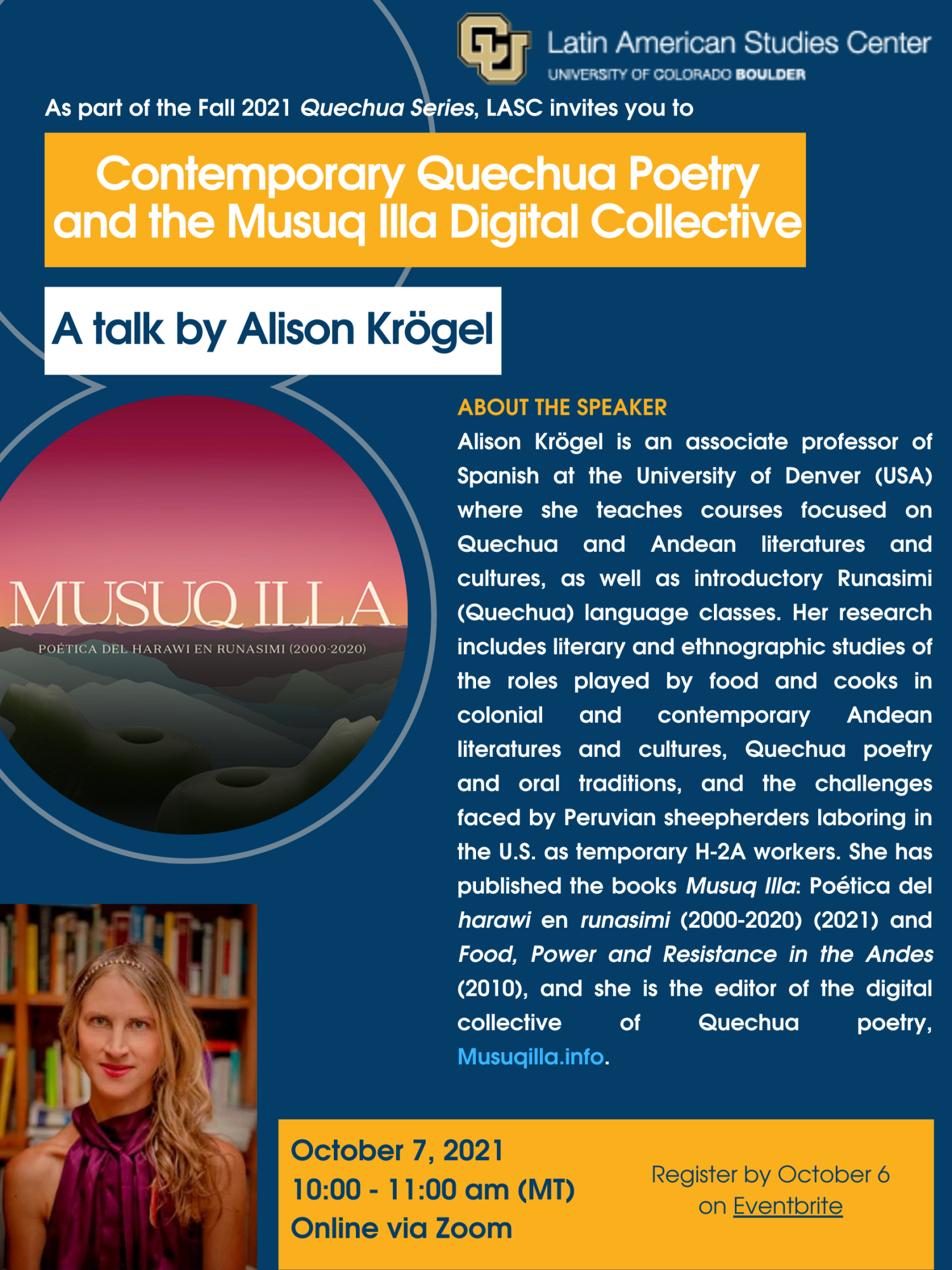
Abstract:
In the indigenous Andean language of Runasimi (also known as Quechua, Kichwa, or Quichua) the word–concept Illa connotes light, generative forces, movement, and brightness, as well as sunrises and new paths or beginnings. Musuq is a Quechua adjective meaning ‘new’ or ‘recent’ and in this talk, Associate Professor of Andean and Quechua Studies, Alison Krögel (University of Denver) will discuss her work as the editor of the recently launched Musuq Illa Quechua Poetry Collective, as well as some of the salient themes, creative energies, and movements in Quechua poetic production in recent years; topics also explored in her book of literary criticism, Musuq Illa: Poética del harawi en runasimi (2000-2020) (Lima: Pakarina ediciones, 2021).
In this talk, Alison Krögel will be joined by Peruvian poet Gloria Cáceres Vargas, who will read some of her Quechua poetry at the event.
About the Speaker (in English & Quechua):
Alison Krögel is an associate professor of Spanish at the University of Denver (USA) where she teaches courses focused on Quechua and Andean literatures and cultures, as well as introductory Runasimi (Quechua) language classes. Her research includes literary and ethnographic studies of the roles played by food and cooks in colonial and contemporary Andean literatures and cultures, Quechua poetry and oral traditions, and the challenges faced by Peruvian sheepherders laboring in the U.S. as temporary H-2A workers. She has published the books Musuq Illa: Poética del harawi en runasimi (2000-2020) (2021) and Food, Power and Resistance in the Andes (2010), and she is the editor of the digital collective of Quechua poetry, Musuqilla.info.
Estados Unidos suyupin Denver Uniwirsidadpi Alison Krögel llank’an. Literatura y Cultura Quechua–Andina sutiyuq kursutan yachachin. Hinallataq Introducción a la lengua runasimitapas yachachillantaq. Kichwa runaq kasqamantapuni hamut’an. Lluqsichiranmi kay liwrukunata: Musuq Illa: Poética del harawi en runasimi (2000-2020) (2021), Food, Power and Resistance in the Andes: Exploring Quechua Verbal and Visual Narratives ( 2010); Musuqilla.info digital runakunaq pruyiktuq idituranmi. Kunan pachan, uwikha michiqkunaq Coloradoq q’asankunapi alamu sach’aq k’ullunkupi runasimipi qillqasqankuta k’uskichkan. Chayqa hawansuyupi uwikha michiqkunaq tiyasqanku rikukuq uyarikuqpiwan krunikakunata ruwan.
About the Guest Speaker (in English and Quechua):
Gloria Cáceres Vargas (Colta-Ayacucho, Perú). A poet, translator, and emerita professor of Quechua and Andean literature (UNE, Lima and Inalco, Paris), Cáceres Vargas is well-known for her translations to the Quechua of José María Arguedas’ short stories and for her bilingual poetry collections, including Yuyaypa K’anchaqnin. Fulgor de mis recuerdos (2015) and her newest poetry collection, Musqu Awaqlla: Tejedora de sueños (2021).
Gloria Cáceres Vargas, Colta llaqtapi, Ayacucho suyupi paqarirqa. Harawikuna, willaykuna qillqasqanqa, kay llapa imay kawsasqanpa rurunmi. Kunankama qillqasqa librunkunata riqsichirqaña: Riqsinakusun (1996 watapi), Munakuwaptiykiqa (2009), Wiñay suyasqayki (2010), Yuyaypa K’anchaqnin (2015), Musqu Awaqlla (2021). Hinallataq achka Hununakuyman Literatura runasimipi ruraymanta tukuy lawpi kaqta rirqa. Kunan kunataq ruwayninqa runasimiman tikrayqa utaq español siminman tikraypas kachkan hinallataq frances simimanpas.
[soundcloud width="100%" height="166" scrolling="no" frameborder="no" allow="autoplay" src="https://w.soundcloud.com/player/?url=https%3A//api.soundcloud.com/tracks/1148321482&color=%23ff5500&auto_play=false&hide_related=false&show_comments=true&show_user=true&show_reposts=false&show_teaser=true"][/soundcloud]
LASC CU Boulder · Quechua Series
Student Testimonials:
"One thing I thought was cool about this talk was that all the poets that she talked about were women. It makes me happy to see a female-led movement."
— Allison Kammerer (Sociology | Women & Gender Studies)
"Listening to Gloria and Alison read the poems and their translations, the sounds of the words, the rhythm and feel of the spoken word was still impactful, it still ignited the love and thrill of language in my chest. The words themselves and their definitions are able to instill the same feeling across languages. 'Ch’usaqchakuy' is a Quechua word that invokes the feeling of loneliness especially when seperated from a lover or close family member. Or 'Quishpi' which sums up the feeling of celebration at the end of a struggle, of liberating yourself and ascending above or beyond something difficult."
— Evelyn Rake (English)
"Stigma and Legacy in Retablo (2017)": A talk by Javier Muñoz-Díaz
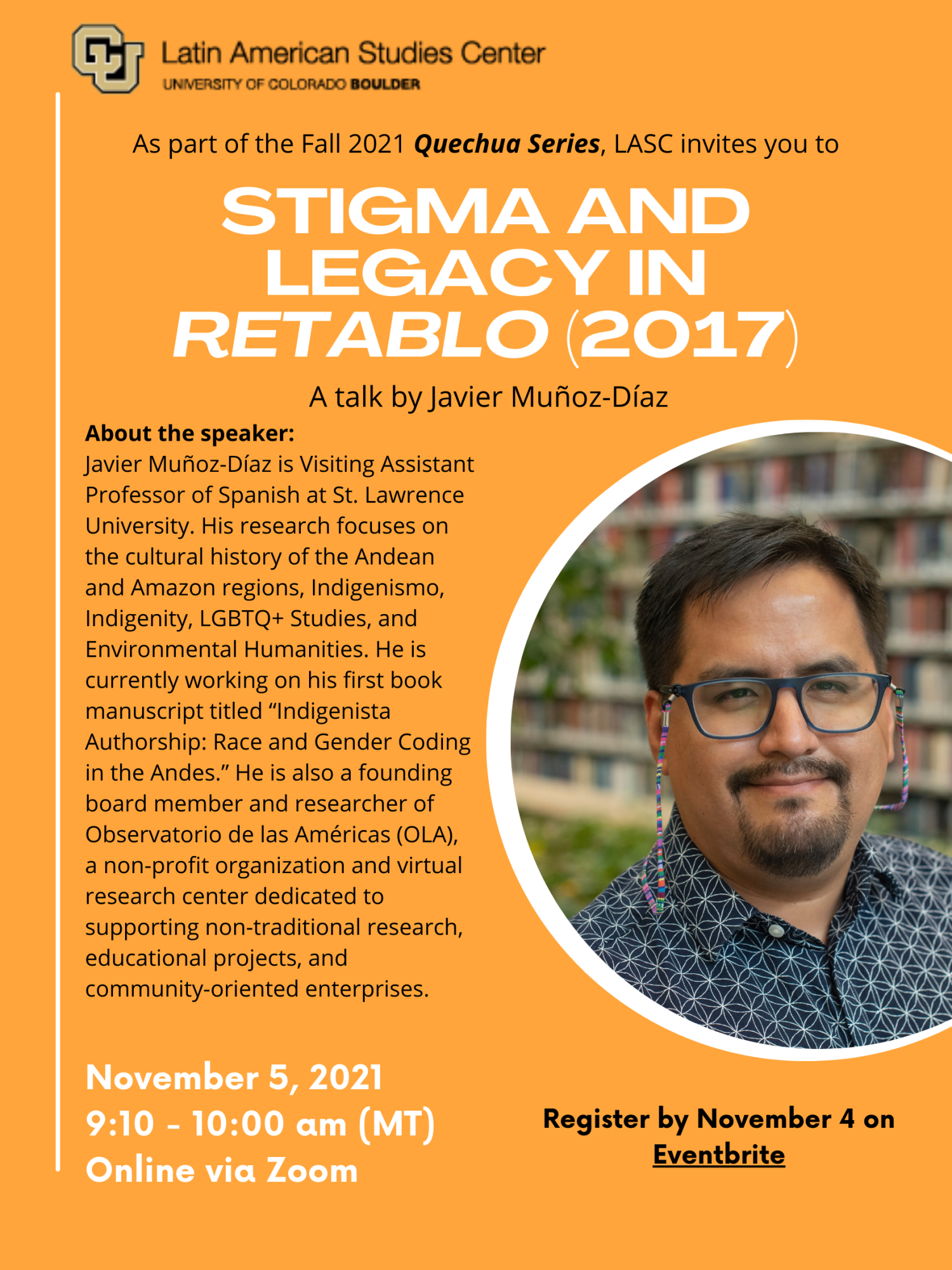
Abstract:
The film Retablo deals with the construction of masculinities in Andean rural communities, where traditional gender roles are strictly enforced and homosexual behavior is punished. The plot focuses on a father-son relationship—the young Segundo is becoming a craftsman under the guidance of his father, but all his world shatters after discovering his father’s homosexuality. By learning how to navigate his father’s stigma and legacy, Segundo articulated an alternative model of masculinity that, nevertheless, seems to be at odds with Andean societies.
About the Speaker:
Javier Muñoz-Díaz is Visiting Assistant Professor of Spanish at St. Lawrence University. His research focuses on the cultural history of the Andean and Amazon regions, Indigenismo, Indigenity, LGBTQ+ Studies, and Environmental Humanities. He is currently working on his first book manuscript titled “Indigenista Authorship: Race and Gender Coding in the Andes.” He is also a founding board member and researcher of Observatorio de las Américas (OLA), a non-profit organization and virtual research center dedicated to supporting non-traditional research, educational projects, and community-oriented enterprises.
Student Testimonial:
"This film is reflective of the way indigenous people in the Andes were colonized and Christianized: Segundo’s struggle to understand gender roles and sexuality highlights the imposition of colonialism by showing the ingrained binary ways of understanding. The film values the continuation of Segundo’s art form and the bond created during the teaching process—showing that the oral tradition in indigenous communities survives, despite the colonial imposition of the gender binary."
— Jordan Vigil (Bachelor of Fine Arts, Emphasis in Printmaking)
Nahuatl Evening
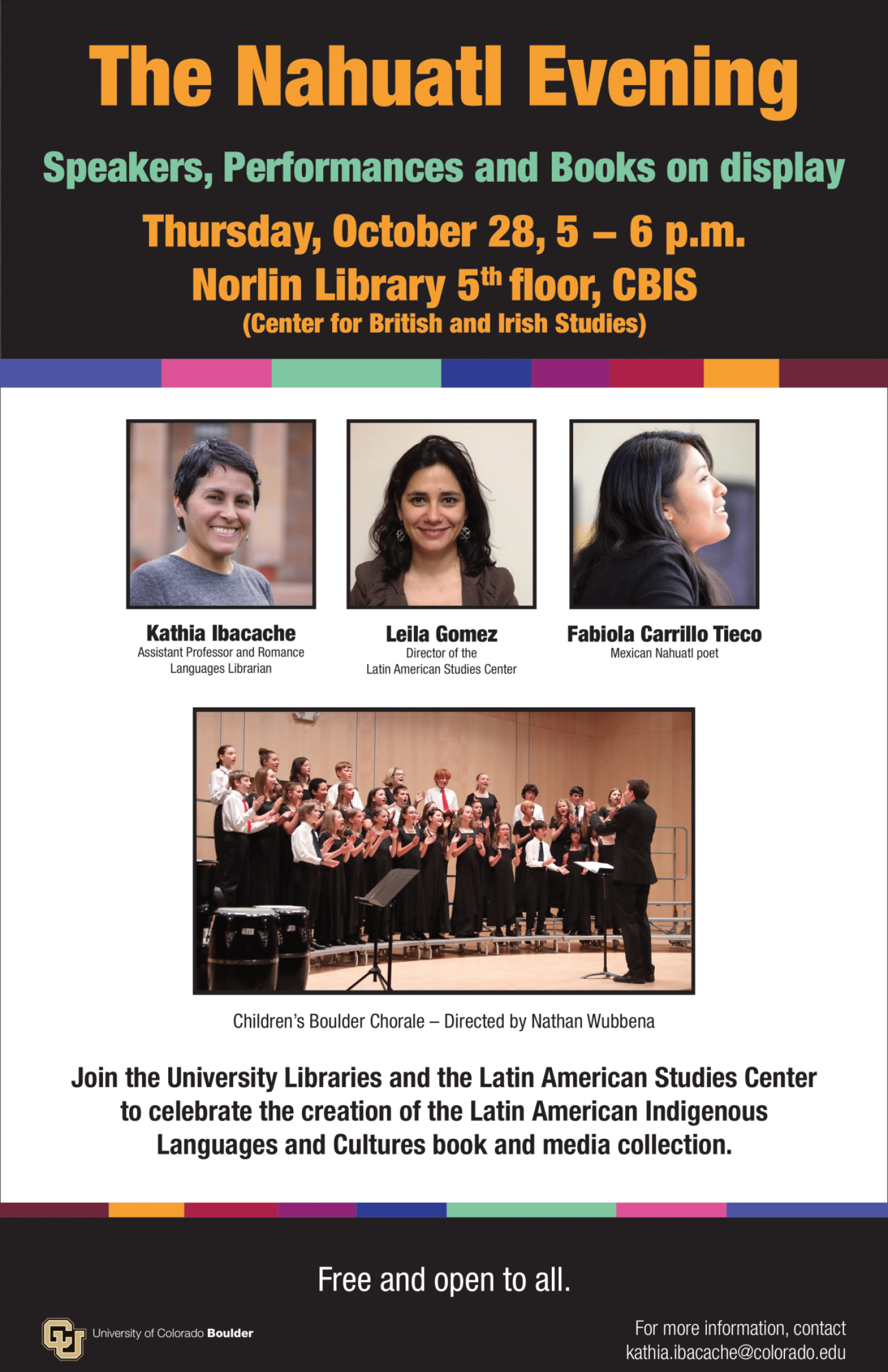
The University Libraries and the Latin American Studies Center celebrated the addition of over 100 book titles by indigenous authors and about Andean topics to the libraries’ collections in the Nahuatl Evening on Oct. 28 from 5 p.m. to 6 p.m.
The Nahuatl Evening featured speakers, performances and books on display, and formally recognized the additions to the University Libraries’ collections including children’s books, adult literature, poetry and more.
At the Nahuatl Evening, three speakers, including Ibacache and Director of the Latin American Studies Center Leila Gomez, talked about the research, courses and conferences at CU Boulder in support of Latin American Indigenous languages and cultures. The event also featured performances by Mexican Nahuatl poet Fabiola Carrillo Tieco, the Boulder Children’s Chorale and a Quechua musical group. The Boulder Children’s Chorale consists of four ensembles for students from kindergarten through ninth grade. They focus on helping expose children to diverse, quality choral repertoire while building their abilities as musicians and a love for singing! Their two auditioned ensembles, Bel Canto and Volante, performed “Koonex” and “Macochi Cochi Pitentzin.”
Dozens of books collected as part of Ibacache’s work to expand the libraries’ indigenous language titles were available for attendees to browse and check-out.
Student Testimonials:
"I found it to be very heartwarming and inspirational to see the youth participating and learning how to sing lullabies, one that is Mayan and one that is Nahuatl (“Macochi Pitentzin'' Nahuatl, lullaby, “Koonex, Koonex” Mayan lullaby). I think it's amazing how young children are learning how to speak and pronounce these songs, and I believe that revitalization in our youth is so powerful as they don’t have preconceived notions of other cultures and languages and act as sponges that absorb so much information. The youth are such powerful tools to extend our fights to future generations."
— Holly Nielsen (Molecular Cellular Developmental Biology, Class of 2023)
"Throughout the evening we had the opportunity to hear poetry recited in Nahuatl as well as traditional lullabies. This was my favorite part of the evening because I have never heard those languages being spoken. It was beautiful to hear the language come to life and to see so many people engaged in trying to understand its history, to speak it, and to maintain it."
— Nadia Muro
Psychology (Sociology | Ethnic Studies minors)
"I was never bored at this event because of all the different types of activities: learning words and phrases in Quechua, listening to several poems from a female indigenous poet, reciting a tongue-twister, and listening to the children’s choir. It was also great to look at the different books and other artifacts the library provided for this event; I enjoyed the hands-on experience of looking at authentic, deeply spiritual books."
— Madi Tobiasz (Psychology)
In-Person Quechua Bingo Night

This semester, LASC hosted our first in-person Quechua Bingo Night, bringing together almost thirty students and faculty who all became Quechua students for a day.
Attendees learned how to count in Quechua, and actively participated with phrases like Huqmanta! 'Again!', Sumaq! 'Great!' and Mana chayta munanichu! 'I don't want that!' while playing bingo. We celebrated five winners, who will receive gift cards as prizes.
We enjoyed food and beverages including the traditional Peruvian chicha morada, made from purple corn, and were serenaded by our very own Quechua student Brenda Aguirre-Ortega and the Andean performing group Kuyayky Foundation. Our Quechua instructor Doris Loayza led us in dancing along to the music, and we all ended the night in high spirits.
It was a fantastic opportunity to teach members of our CU community about the Quechua language and Andean cultures!
Student Testimonials:
"I really enjoyed the dancing. The performers were truly amazing, and I could tell how passionate they were about their art. The dancing was so fun and really created a sense of community within the space. I really do believe that this is what decolonization and anti-racism is rooted in. Community and appreciation of other cultures is so important."
— Meha Khanna (she/her)
Political Science (Women & Gender Studies minor)
Director of D&I for CU Student Government
"I honestly struggle a lot with languages, but the way we learned was very easy and I had a lot of fun learning how to speak the language. I learned so easily and had such a great time with it."
— Nadine Koo
Sociology
Senior
Rhythms and Colors of Brazil
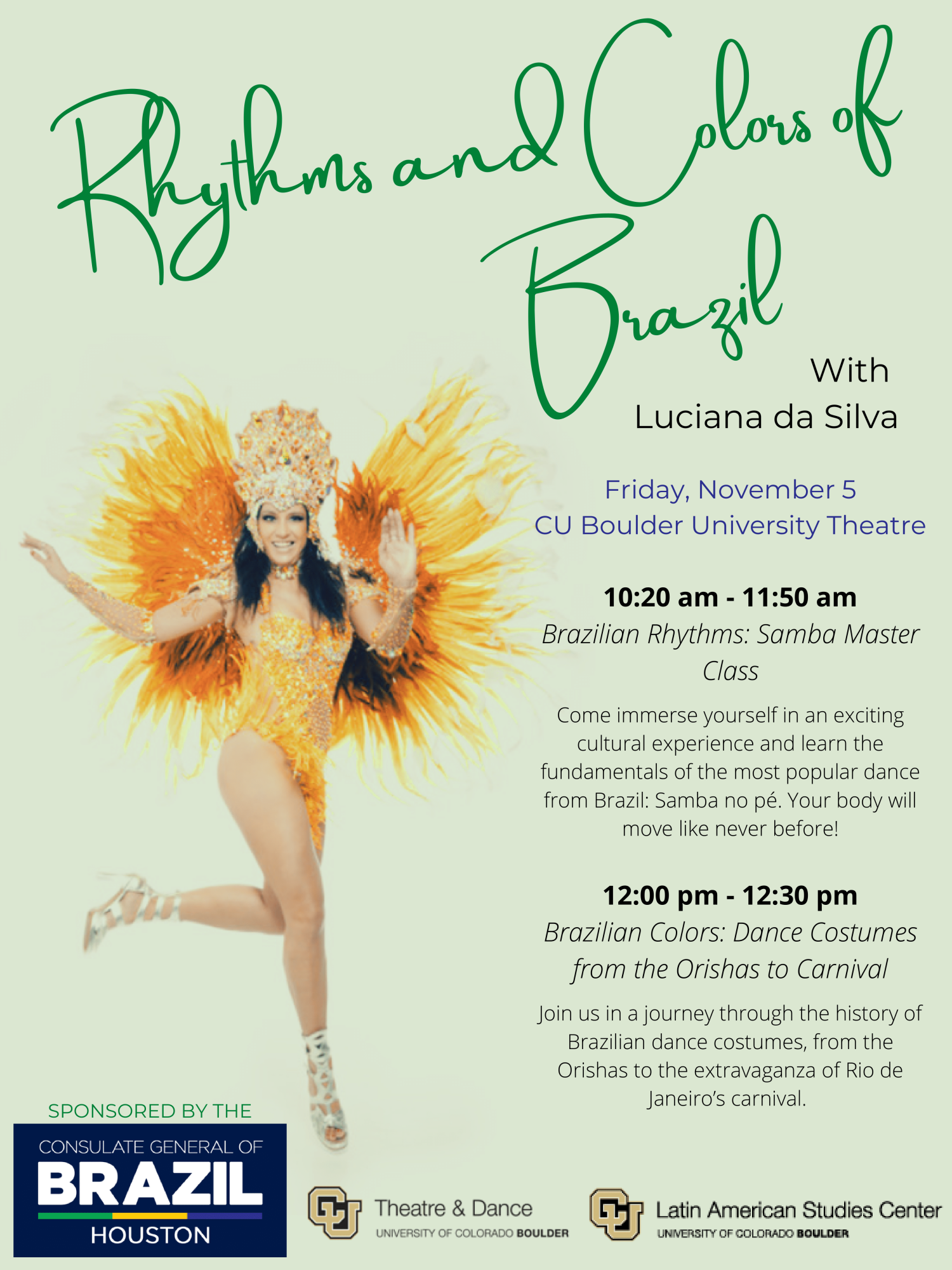
LASC and the CU Theatre and Dance Department proudly partnered to present a samba event, "Rhythms and Colors of Brazil," sponsored by the Consulate General of Brazil in Houston, Texas.
The event featured presenter Luciana da Silva during two sessions: a Samba Master Class, "Brazilian Rhythms," where participants learned the fundamentals of the most popular dance from Brazil, Samba no pé; and a presentation of dance costumes from the Orishas to Carnival, "Brazilian Colors".
The event took place on Friday, November 5 at the CU Boulder University Theatre, and both sessions were open to all to attend.
US Latinos/as/x and Latin America Roundtable
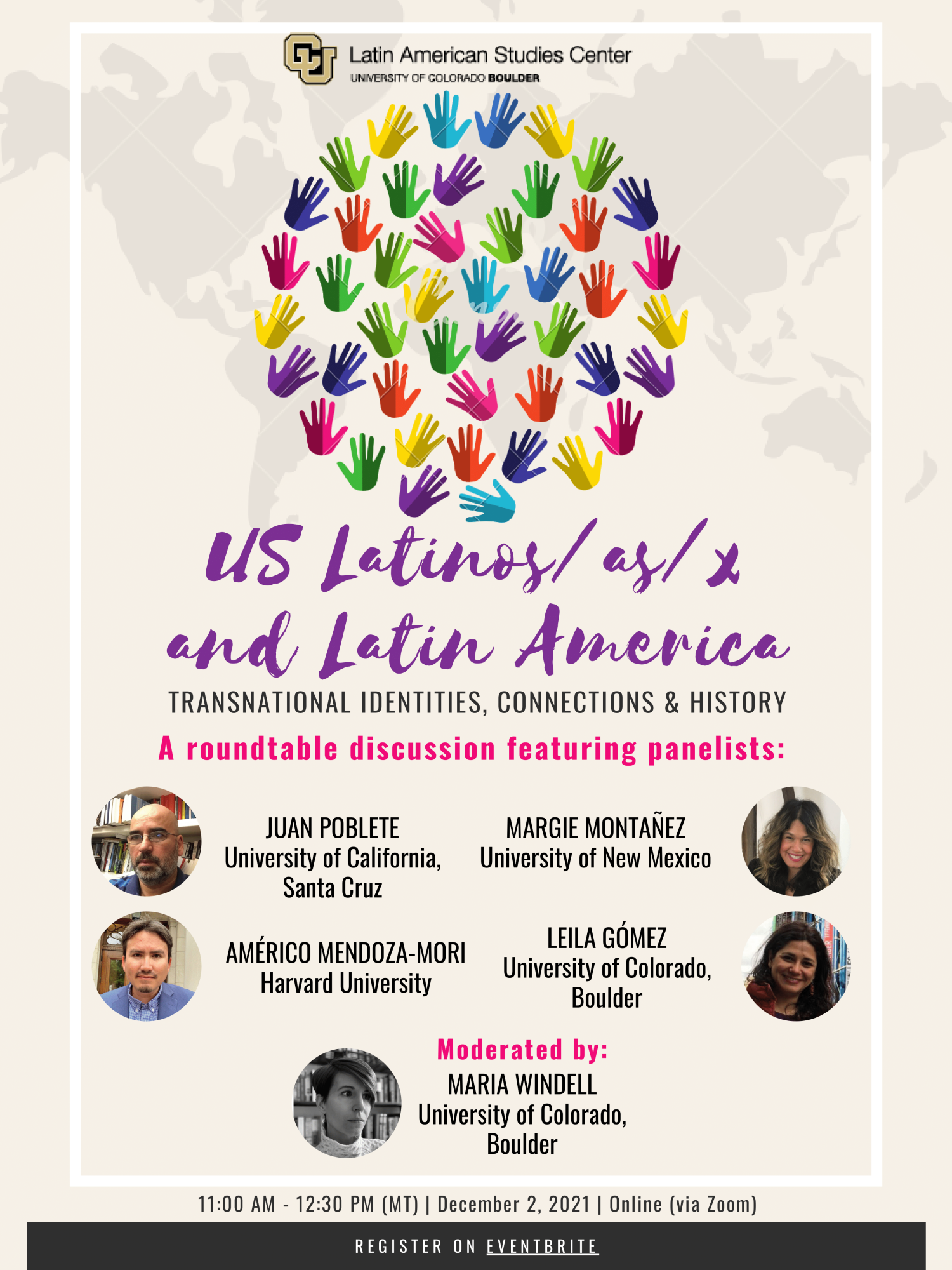
Latin Americans and Latinos/as/x in the United States often claim identities that belong in cultural spaces located and imagined beyond the traditional and oversimplified binary of aquí (here) and allá (there). These identities inhabit transnational networks and cultures.
The presenters in this round table will discuss the multiple connections between Latin America and US Latino/a/x communities historically and today. From transnational perspectives and approaches outside the traditional paradigm of “immigration,” the speakers will provide insights in response to the new realities created over the course of the long, multifaceted history of relationships between the US and Latin America, in light of the economic, social, political, and cultural global conditions today.
Presenters:
Juan Poblete (University of California, Santa Cruz)
Margie Montañez (University of New Mexico)
Américo Mendoza-Mori (Harvard University)
Leila Gómez (LASC Director, University of Colorado, Boulder)
Moderator:
Maria Windell (University of Colorado, Boulder)
2nd Virtual Quechua Bingo Night
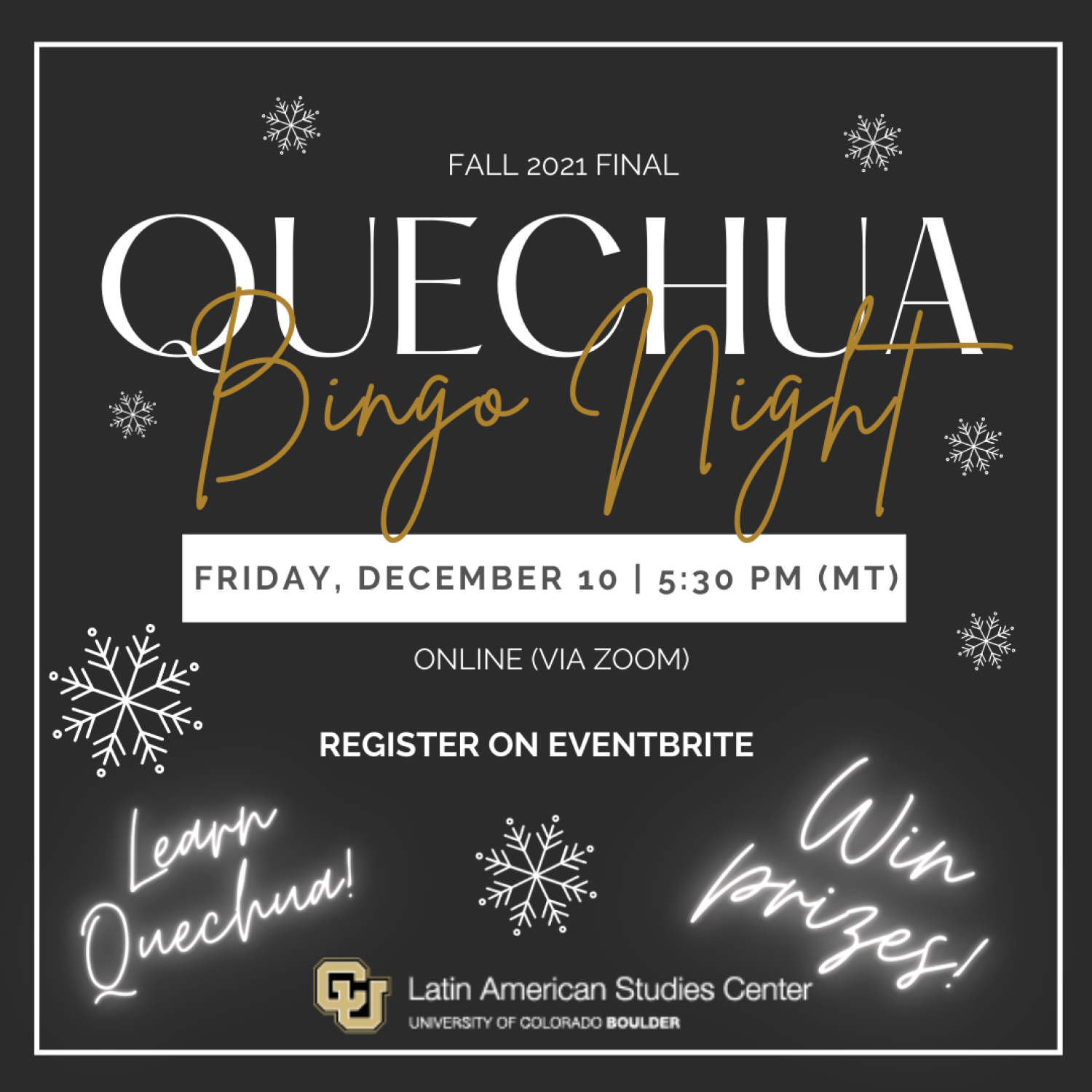
Following the success of our two previous Quechua bingo nights, LASC ended the semester with another virtual game night, again open to any and all, who could participate from across the country (or even abroad!) via Zoom.
Attendees learned (or, in the case of previous attendees, were able to continue practicing) how to count from 1-100 in Quechua and then tried their luck at bingo. Winners were given gift cards as prizes.
We look forward to hosting more Quechua bingo nights in the coming years with our fabulous instructor, Doris Loayza!

